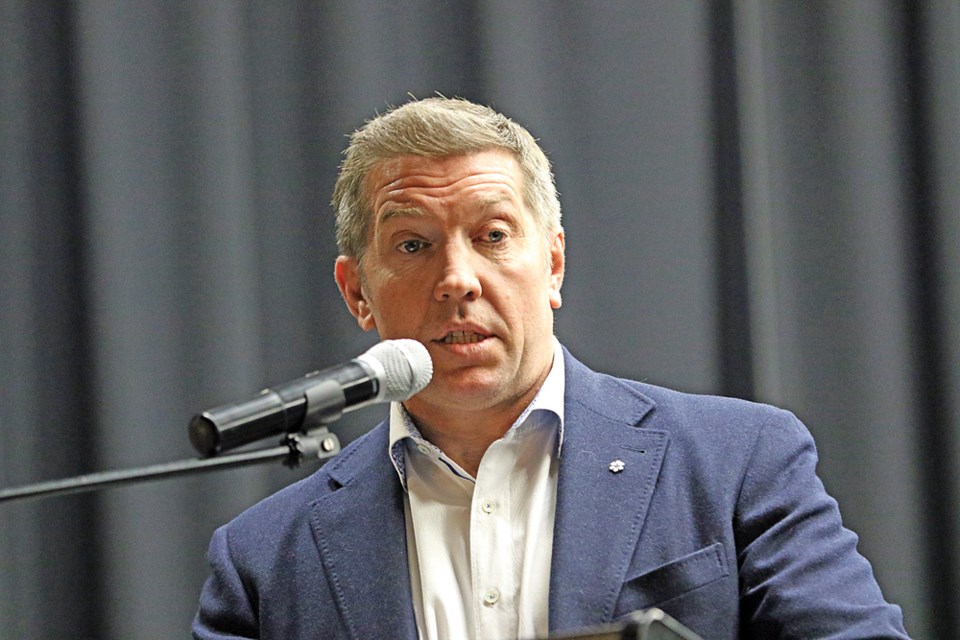Sheldon Kennedy, a sexual abuse survivor and a former NHL hockey player, wanted other people that are in the situation he was in to know something.
“My biggest thing is that I want people to know they’re not alone and that there’s hope,” he said. “My biggest fear was that I was the only person that this has ever happened to and that it had to have been my fault.”
He added that sometimes children who are sexually abused don’t even know it’s not normal because they’re so young.
Kennedy, who was sexually abused by his junior hockey coach Graham James during his time with the Swift Current Broncos, was the keynote speaker at a one-day conference organized by the North East Outreach and Support Services Jan. 24 focused on child abuse. The It Takes a Community Conference included speakers from the Northeast and other places like the Battlefords, Regina, Saskatoon and Prince Albert.
“We, as an organization, know that awareness is vital to ending this in our communities – and it’s not just our awareness, it’s spreading that awareness and spreading that with all facets of our communities,” said Louise Schweitzer, North East Outreach’s executive director. “People need the information to make the knowledgeable choices.”
While Kennedy touched on the sexual abuse and how it affected him as a high school student, professional hockey player, private citizen and an activist, he focused more about his efforts to try to change the system. One of those efforts is the Sheldon Kennedy Child Advocacy Centre, which takes a multi-disciplinary approach involving police investigators, social workers, paediatricians, the crown prosecutor’s office and First Nations. The Centre has investigated more than 5,000 cases involving children from ages four to 12.
Kennedy said it’s important to break down the separation between different services to address the root of the problem: childhood toxic stress situations caused by domestic abuse, sexual abuse, or growing up in a household where the parents are abusing drugs or alcohol. Of the 5,000 cases the centre has seen, 63 per cent of them presented three or more of the following issues: suicidal ideation, mental health, addiction, depression, self-harm, substance abuse and hyper-sexualized behaviours.
“We don’t connect those dots. The highest percentage of mental health issues across this country stems from adverse childhood experiences and a lot of times, we don’t understand that. We keep the silos going,” he said. “To me, if they’re presenting those issues at a young age, walking in our doors, knowing what’s gone on in their life, why are we waiting until they wind up on our streets, end up dead – when it’s too late, or they’re in a treatment centre?”
Kennedy said the current way of doing things is unco-ordinated and hurting families.
“If you took an x-ray of a broken leg, you cut that x-ray in four slivers and give one to police, one to social services, one to health and one to the crown prosecutor and you say: you’ve got to put that leg together but you’re not allowed to show your x-ray to one another,” he said. “How do you think we’d put that leg together? Not very well, but that’s the way we deal with these cases when they come through.”
In fact, Kennedy argues we can’t afford to continue to deal with such issues as we do now.
“We need to have a systemic shift because we can’t fiscally afford,” he said, “to keep working at the outer layer of the onion knowing where this is taking a lot and a high percentage of our individuals.”
In Alberta, legislation has been changed to allow all of the disciplines that are involved in child abuse to share information.
Kennedy added that awareness of child abuse is an important step to stopping it.
“We look at people who hurt kids and think they jump out from the corners of buildings from dark places and that’s not the way it works. With the 5,000 investigations we’ve conducted, 98 per cent of these kids know their abusers,” he said. “Forty-seven per cent of these kids are being abused in their own home by a parent or caregiver. It’s important we pay attention in our communities and to know what to do if a child does disclose what’s happening to them.”
Schweitzer said she thought Kennedy’s talk was received well.
“I don’t think that anybody could truly give us the insight as much as someone who’s been through it, overcome it and moved on with their lives to make it as positive as you can make that.”
The executive director said the conference was something she wanted to do again next year.
“We feel it was a successful and productive use of awareness dollars. We felt it reached across a broad variety of individuals and it is something we want to do again.”
Anybody experiencing abuse is encouraged to contact North East Outreach’s crisis line at 1-800-611-6349 or the Kids Help Phone at 1-800-668-6868.




